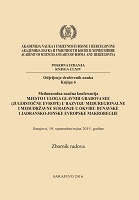INTEGRIRANI I ODRŽIVI RAZVOJ GRADOVA ZEMALJA ZAPADNOG BALKANA: ULOGA I POZICIJA U EVROPSKOM KONTEKSTU
INTEGRATED AND SUSTAINABLE DEVELOPMENT OF CITIES IN THE WESTERN BALKANS: ROLE AND POSITION IN THE EUROPEAN CONTEXT
Author(s): Elmir Sadiković
Subject(s): Regional Geography, Rural and urban sociology, Economic development, EU-Approach / EU-Accession / EU-Development
Published by: Akademija Nauka i Umjetnosti Bosne i Hercegovine
Keywords: European Union; EU; cities: sustainable development; Western Balkans;
Summary/Abstract: Sustainable development of cities includes three main aspects: environmental, economic and social sustainability in the long run. To achieve these objectives, it is necessary to have an integrated strategic approach to the planning of city development. Integrated city development in the broadest sense implies a holistic rather than sectoral approach to the planning of the development of the city, which includes all important economic, infrastructural, social and other sectors and various interests. Close to 70% of the population of the EU lives in cities, and 59% of the EU population lives in the metropolitan areas which employ 62% of the working population. The cities account for more than 2/3 of the total GDP of the European Union. That is why the economic development of the European Union in the future is essentially conditioned by the development of cities, and only in partnership with the cities can European Union achieve its economic, social and political objectives. Cities are the driving force of economic development, inventiveness and creativity, but are also the hardest hit by the problems of unemployment, poverty, segregation and pollution of the environment. The European Union has recognized that the various economic, environmental, climatic, social and demographic challenges faced by the cities in the European region are closely linked and that in this respect it is necessary to take appropriate political and economic measures, using an integrated approach, in order to address these issues and challenges. In order to ensure integrated and sustainable development of cities, the European Union’s “Europe 2020 Strategy” as one of its goals defines facilitating education, economic development, social integration and environmental protection in cities. The aim of the EU cohesion policy in the period 2014-2020 is actually the adoption of integrated strategies for sustainable urban development, in order to enhance the synergy of local authorities, or potential investors with the resources allocated by European funds. The Western Balkan countries are at different stages of integration into the European Union. From this standpoint, the cities of Western Balkan countries have a different position with respect to the possibility of using European funds. Despite that, “Europe 2020 Strategy” provides an opportunity to all Western Balkan countries to use different funds and strive for sustainable economic development of their cities.
- Page Range: 248-261
- Page Count: 14
- Publication Year: 2015
- Language: Bosnian
- Content File-PDF

